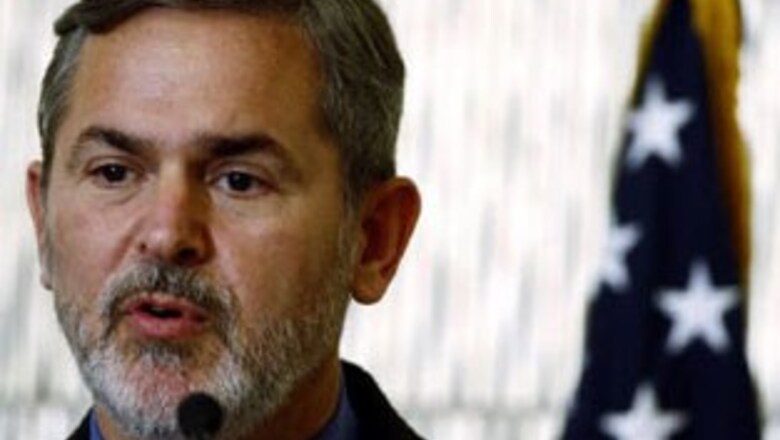
views
New Delhi: Pakistan has made a promising start into the Mumbai attack investigations and on tackling militancy, but still had a long way to go in eliminating the threat, a senior US official said on Thursday.
Assistant Secretary of State Richard Boucher told reporters in New Delhi that Pakistan had taken some steps such as detaining people accused by India of planning the Mumbai attacks and cracking down on suspected militant groups.
"We have said what we have seen is promising, but it's a long way to go to eliminate the threat from Pakistani soil," Boucher said after a meeting with Indian Foreign Secretary Shiv Shankar Menon.
"The goal that we all have is to make sure that this can't happen again and that's a continuing process, an ongoing process." Boucher, who travelled to Pakistan this week, will discuss the progress of investigations into the Mumbai attacks with Indian officials and douse tensions sparked by sharp exchanges between the nuclear-armed rivals.
"United States and India are both determined to make sure we find out who did it, how it was done and how to make sure this does not happen again," Boucher said.
"We are dealing with people who are responsible for organising this attack and following the leads as far as they go to make sure we know everybody who is involved."
Indian officials said they would take the opportunity to discuss with the United States "a way ahead from the present situation".
"We will look at what options we have on the table and what is the level of international support for those options," a senior Indian government official told Reuters.
India is also expected to share with Boucher the latest in the Mumbai investigations. The FBI is helping in that probe. India handed over this week to Pakistan what it said was evidence of Pakistan militants' complicity in the Mumbai raids by 10 gunmen that killed 179 people.
Islamabad, while denying any state role in those attacks, has said it was looking into the evidence, which included taped conversations between the attackers and their handlers in Pakistan and Pakistani-made weapons and articles used by them.
Pakistan's national security adviser, Mahmud Ali Durrani, was dismissed late on Wednesday for disclosing the lone surviving Mumbai gunman, Mohammed Ajmal Kasab, was Pakistani.
While the dismissal was seen by the Indian media as punishment for revealing the truth, Pakistani media speculated that it showed a split in power circles in Islamabad.
Pakistan had said it could not find Kasab's name on a national database of citizens and it was investigating. But Durrani said authorities, including the powerful security agencies, had already decided to confirm the gunman was Pakistani.
"It had been decided yesterday that we would tell the world that he is a Pakistani because hiding that makes no sense," Durrani told Reuters in a telephone interview on Thursday.
Diplomatic Offensive
But instead of scoring well with the evidence and a sustained diplomatic offensive, India could have overplayed its hand by saying the military option remained open, analysts say.
They say by upping the rhetoric India could have missed an opportunity to discredit Pakistan's feared spy agency and allowed Pakistan to play the victim of an Indian propaganda war.
India's media have also raised doubts if the evidence was enough to back Indian Prime Minister Manmohan Singh's statement that Pakistani official agencies were linked with the attacks.
"Certainly the dossier India has prepared for Pakistan, does not contain material which substantiates this belief," wrote Siddharth Varadarajan, strategic affairs editor of The Hindu newspaper.
Pakistan's confirmation that Kasab is its national could also be seen by the world as constructive cooperation by Islamabad. But India said on Thursday enough was not being done.
"After over a month of the operation there continues to be recalcitrance in bringing the perpetrators to justice," Mukherjee told reporters.
The persistent exchange of tough words has kept tensions alive between the nuclear-armed neighbours which have fought three wars since 1947 and came close to a fourth after India's parliament was attacked by gunmen in 2001.
India wants Pakistan to dismantle the camps training militants and hand over 40 suspects, some of them said to be the main planners of the Mumbai raids and other militant attacks in Indian cities.
Mukherjee said India's job had been facilitated by the capture of the Pakistani militant in Mumbai. "Unfortunately, despite this, we have seen a consistent flip-flop in the reaction of the government in Islamabad."
















Comments
0 comment